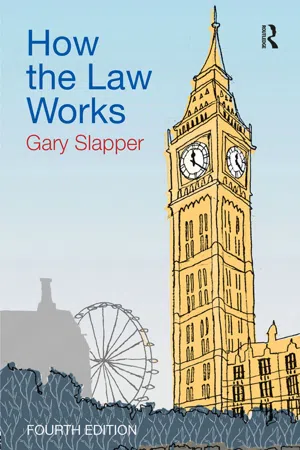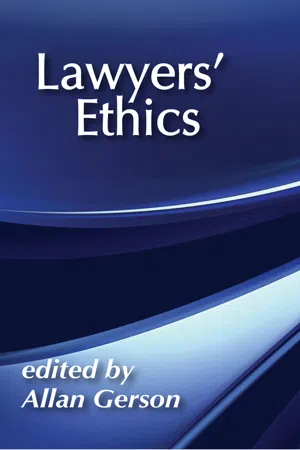Law
Lawyers
Lawyers are legal professionals who provide advice and representation to individuals, businesses, and organizations in legal matters. They are trained in the interpretation and application of the law, and they may specialize in various areas such as criminal law, corporate law, or family law. Lawyers play a crucial role in advocating for their clients' rights and interests within the legal system.
Written by Perlego with AI-assistance
6 Key excerpts on "Lawyers"
Learn about this page
Index pages curate the most relevant extracts from our library of academic textbooks. They’ve been created using an in-house natural language model (NLM), each adding context and meaning to key research topics.
- eBook - ePub
- Gary Slapper(Author)
- 2016(Publication Date)
- Routledge(Publisher)
The work of solicitors varies greatly. Some work as sole practitioners in small high-street practices, whereas others work in large international firms with thousands of staff. Solicitors usually deal directly with clients – individual and corporate clients – giving advice, preparing documents, briefing barristers (often referred to as ‘counsel’) and sometimes working in court advocacy. Legal executives tend to specialise in particular areas of law such as aspects of family law, criminal law or civil law. For many centuries, different types of organised work in law evolved very gradually in relation to the particular tasks required by the social and economic goings-on of the day. Barristers have the longest traceable professional history, but it is worth noting that at the outset of what became the noble and revered professional Bar, advocacy was regarded as simply work that was required to be done in what was, at the time, an innovative way. As courts of various kinds began to develop, so people being judged by them began with growing regularity to get others to speak on their behalf. In Britain, a man was entitled to have an advocate – called a forespeca in Saxon times. During the reign of Alfred the Great (871–899), for example, a man was accused of stealing a belt, and one of his accusers tried to claim his land. One writer of the time recorded that the defendant ‘sought me and prayed me to be his intercessor. Then I spoke on his behalf and interceded for him with King Alfred’. 5 Such beginnings can be compared with the emergence of information technology (IT) today. Twenty years ago there began to appear little departments or units – or sometimes simply one expert – dedicated to installing, maintaining and problem-solving IT in companies, hospitals, colleges and schools. Computers were becoming a common feature of organisational work. Since then, all sorts of specialist workers (such as software engineers, security experts and webmasters) have developed - eBook - ePub
- Allan Gerson(Author)
- 2017(Publication Date)
- Routledge(Publisher)
What I have just said reveals in simple words the role of the lawyer in America. In executing his role, the lawyer engages in activities incident to the practice of law. He may advise his client in respect to his legal rights or responsibilities, draft the legal documents necessitated by his client’s personal or business affairs, act as agent for his client in negotiating and consummating commercial transactions with others, or act as an advocate for his client in legal proceedings before courts or administrative tribunals. In doing any of these things, the lawyer owes his client complete and dedicated allegiance.To protect prospective clients and the public against incompetent or unscrupulous Lawyers, government requires every applicant for admission to the bar to demonstrate, in appropriate ways, that he has a fair knowledge of law and a trustworthy character. Moreover, it disbars from further practice Lawyers who have shown themselves unworthy of possessing a law license by violating specified laws or ethical standards.A lawyer performs his role in an acceptable manner if he discharges, with reasonable skill and fidelity, the obligations which his high calling imposes upon its practitioners. These obligations consist of his obligation to his client, he obligation to the court or administrative tribunal before which he appears, his obligation to society, and his obligation to himself. I will endeavor to delineate these obligations.The lawyer is not obliged to accept as a client anyone who seeks his professional aid. But whenever he undertakes to perform any legal task for a client, he impliedly assures his client that he possesses reasonable legal knowledge and skill; that he is competent, or will in apt time make himself competent by study of the relevant facts and law to perform his undertaking in reasonable fashion; and that in performing his undertaking he will exercise his knowledge and skill with diligence and fidelity, solely in his client’s interest. - eBook - ePub
May It Please the Court
Judicial Processes and Politics In America
- Brian L. Porto(Author)
- 2017(Publication Date)
- Routledge(Publisher)
legal aid Lawyers , providing free legal representation to impoverished clients in criminal and civil cases, respectively. Part III will examine this diverse legal profession, as it exists in the new millennium.Today, the legal profession remains diverse, although within the law firm realm, the trend is toward serving “institutional” clients, usually business corporations, which generally offer the highest payments for legal services.38 Serving corporate clients accounted for just over half of Lawyers’ efforts in 1975; by 1995, it accounted for two-thirds of those efforts, and the trend continues today.393.3 The Legal Profession Today3.3.1 EntryStates determine the requirements for admission to the practice of law. In 42 states and the District of Columbia, one must complete a three-year course of study in law school, preferably a law school approved by the American Bar Association, to be eligible to take the bar exam.40 At some law schools, though, a student can complete three years of coursework in an “accelerated Juris Doctor (JD)” program by attending school year-round for two years. To date, only a limited number of students at a few law schools are enrolled in accelerated JD programs, which enable them to enter the job marker earlier but reduce internship opportunities during law school.41 Eight states, including California, Maine, New York, Vermont, Virginia, Washington, West Virginia, and Wyoming, permit the substitution of several years of law office study for law school.42 In Vermont, for example, one can substitute for law school four years (at least 25 hours per week for at least 44 weeks per year) of reading law - eBook - ePub
- Ryan Murphy, Frances Burton(Authors)
- 2020(Publication Date)
- Routledge(Publisher)
unqualified sectors of the workforce, which together process English law through the justice system. This variegated workforce, which deals with the cases which end up in law reports and textbooks, but which set out as just someone’s dispute, are now operated in as many as eight distinct legal professional specialisms, each ssupervised by their specific regulators (or by none). This army of practitioners is already numerous without even considering the peripheral professions, such as psychologists, psychiatrists, accountants, surveyors, secretaries and administrators who support the administration of justice, and the wide range of other specialist experts who support the specific legal professionals in the administration of justice. Nor are all those who might consider themselves to be legal practitioners, including those who might have either started out as law graduates or taken some law modules in a mixed degree with other disciplines, since in the case of the newest group of employees of legal professionals, the ‘paralegals’, there will be a significant group who perhaps will not have studied any law at all prior to taking up legal employment where they will aim to learn ‘on the job’.Besides the ‘paralegals’ there are also some other puzzling terms which need explanation, such as ‘attorneys’ (who are not simply foreign Lawyers, particularly in America where the word is much used to describe legal professionals, since they also exist in England and Wales) and ‘counsel’ (which is not simply another word for Lawyers in some other countries, particularly other common law jurisdictions, or for an English or Welsh ‘barrister’, but is commonly used by companies to describe their ‘in-house’ Lawyers who may be barristers or solicitors, or possibly neither). Counsel is also normally used to describe a barrister who is instructed in a particular case. - eBook - ePub
- Janice Denoncourt(Author)
- 2013(Publication Date)
- Routledge(Publisher)
3 The Legal ProfessionIntroduction In England and Wales, there are essentially two main branches of the legal profession – solicitors and barristers.‘Solicitors’ advise individuals and organisations on legal matters and ensure that their clients act in accordance with the law. Solicitors usually work in an office rather than in court. There are over 116,000 practising solicitors in England and Wales, governed by the Solicitors Regulation Authority (SRA). Almost 45 per cent of solicitors are women and over 11 per cent of all solicitors are from ethnic minority groups.‘Barristers’ provide two main services – advocacy (representing clients in court) and giving specialist opinions on complex legal matters. They generally receive instructions through solicitors. There are around 12,000 barristers practising in the UK, governed by the Bar Standards Board. About 68 per cent of barristers are men and 11 per cent are from ethnic minority groups.The distinction between solicitors and barristers has blurred slightly over time. Since the 1990s solicitors have been able to represent clients in the lower courts (such as magistrates’ courts) and, if they have enough experience and gain specific ‘higher rights’ qualifications, they can become ‘solicitor advocates’ and represent clients in higher courts (such as Crown Courts or the High Court).Barristers are not allowed to form partnerships. Groups of barristers share offices called ‘chambers’ and are allocated work by a barrister’s clerk, who is also responsible for negotiating the barrister’s fees. A barrister can only be employed by a solicitor and can only meet the client he represents if the solicitor is also present.Queen’s Counsel (QC) or a ‘silk’: senior barristers are known as Queen’s Counsel and they generally appear with a junior barrister assisting them. The Queen’s Counsel Selection Panel makes the award of Queen’s Counsel. The Selection Panel is supported by its own Secretariat, which aims to serve the public interest by offering a fair and transparent means of identifying excellence in advocacy in the higher courts of England and Wales. - eBook - ePub
- Jacqueline Martin(Author)
- 2014(Publication Date)
- Routledge(Publisher)
3 There is no maximum on the number of partners in a firm of solicitors. The size of firms varies from the sole practitioner to partnerships with over 100 partners and several hundred assistant solicitors.4 The work of a solicitor will vary according to the type of firm. Small high street firms are likely to concentrate on family law, wills and probate, housing law, consumer law and criminal law. Large city firms specialise in business and commercial law.5 Other careers are available as an employed lawyer in an organisation such as the CPS, Civil Service or local authority. Solicitors are also employed by private businesses as legal advisers.12.1.3 Advocacy rights1 Solicitors in private practice can also act as advocates. They have always had full advocacy rights in the Magistrates’ Court and the County Court.2 The Courts and Legal Services Act 1990 allowed them to apply for an advocacy certificate for rights in the higher courts, but only about 5% have applied for a certificate.3 The Access to Justice Act 1999 provided that all solicitors will be given full rights of audience. The intention was to bring in new training requirements to ensure that newly qualified solicitors will automatically have advocacy rights but this has not yet happened.4 Solicitors employed by the CPS may act as a prosecutor-advocate in any court for which they hold an advocacy qualification.5 Solicitors employed by the Legal Services Commission may act as an advocate to represent members of the public in any court for which they hold an advocacy qualification.6 Other employed solicitors only have rights of audience to represent their employer.12.2 Barristers12.2.1 Training 1





